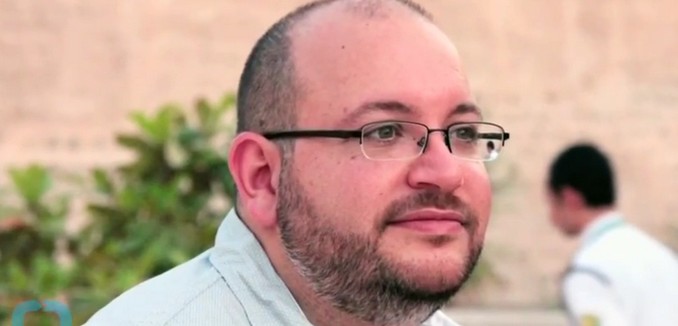The espionage trial of Washington Post reporter Jason Rezaian began today in Tehran, with the prosecution citing a letter Rezaian sent to the White House promoting closer ties between Iran and the United States as evidence, The New York Times reported today.
Jason Rezaian, the Washington Post correspondent accused by Iran of espionage who has been imprisoned for more than 10 months, went on trial in a Tehran courtroom on Tuesday morning, state news media reported….
The Iranian government is presenting two pieces of evidence of espionage, Mr. Rezaian’s brother, Ali Rezaian, said: an American visa application for Yeganeh Salehi, Jason Rezaian’s wife, an Iranian citizen and a journalist, and a form letter sent by Mr. Rezaian to Barack Obama’s 2008 White House transition team offering help to improve relations between Iran and the United States. It is unclear why the Iranian authorities believe those documents to be incriminating….
Mr. Rezaian and Ms. Salehi were arrested in July at their home in Tehran. Ms. Salehi was released on bail after a few months and warned not to discuss the case; Mr. Rezaian has remained in prison, where he has been interrogated and denied medical treatment and legal counsel.
The trial is closed to the public and Rezaian’s relatives were barred from attending. The Washington Post had sought to send an editor to observe the trial.
The Atlantic reported that the judge in the case has been sanctioned by the European Union for his human rights record.
One potentially telling detail about the otherwise mysterious proceedings is the judge assigned to the case. “The presiding judge, Abolghassem Salavati, is known for handing down harsh sentences and is accused by human rights groups of cracking down on journalists and activists,” the BBC reported. “He has been dubbed the ‘judge of death’ for imposing several death sentences after the 2009 post-election opposition protests.” In 2011, Salavati was placed on a European Union blacklist for human-rights abuses, and last year, he was also accused of leading a crackdown on political activists and journalists within the country.
Salavati was also the presiding judge for the trials of three American hikers who were lured into Iran. They were eventually freed after $1.5 million in bail money was paid to Iran.
It was reported last month that Rezaian had been formally accused of having ties to the National Iranian American Council, an advocacy group that promotes closer ties with Iran.
Rezaian was arrested last July along with his wife. The charges against him were not publicized until last month, and he was only allowed limited contact with his court-appointed lawyer, Leila Ahsan, in advance of the trial.
Iranian foreign minister and chief nuclear negotiator Mohammad Javad Zarif was mocked last month for claiming that Iran did not “imprison journalists or dissidents.”
The reporter’s ordeal has prompted editorials in The Washington Post questioning the safety of visitors to Iran and the trustworthiness of the regime in regards to its nuclear program. An editorial in the paper last week called Rezaian’s trial part of “an aggressive campaign to bully the United States and its partners into weakening” the terms of a deal currently being negotiated with Iran to limit its nuclear program.
[Photo: wochit News / YouTube ]




